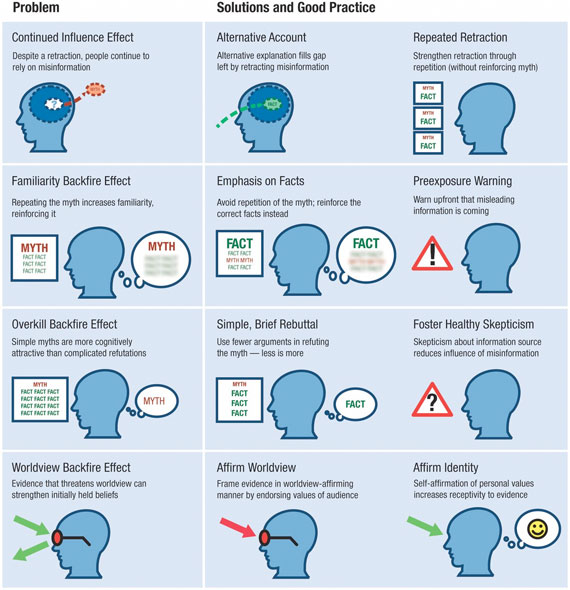
Congratulations to John Cook for being co-author on two peer-reviewed papers published this week, Nuccitelli et al. (2012) and the paper discussed in this post, Lewandowsky et al. (2012).
Last November, we released the Debunking Handbook, an introduction to the psychological research into misinformation and practical tips on how to successfully debunk myths. The booklet was intentionally short - briefly covering the research with the emphasis on practical tips for communicators. A more comprehensive scholarly review, Misinformation and Its Correction: Continued Influence and Successful Debiasing, has now been published in the journal Psychlogical Science in the Public Interest (and I'm happy to report the full paper is freely available to the public). The review is a thorough examination of the psychological research into misinformation but also provides a set of practical guidelines that are even more concise than the Debunking Handbook.
Four of the co-authors of the paper are scientists who have conducted much of the research - Stephan Lewandowsky (who gives a detailed two part interview about the paper), Ullrich Ecker (who wrote about the paper in The Conversation & Huffington Post), Colleen Seifert and Norbert Schwarz. The fifth co-author is myself. The paper looks at where misinformation comes from - from rumours, governments, vested interests and yes, the Internet. We explore the psychological research into what makes corrections fail, or even backfire.
Finally, we provide specific recommendations for the debunking of misinformation. This includes a graphic summary of the various problems to watch out for when you're refuting misinformation and suggested solutions. This is a very handy visual guide which if I'd thought of at the time would've included in the Debunking Handbook. If you find yourself frequently having to respond to misinformation, I suggest downloading this PDF and keeping a print-out near your monitor :-)

The Debunking Handbook and Misinformation and Its Correction: Continued Influence and Successful Debiasing were inspired by the absence of a practical summary of research into how to effectively refute misinformation. There is a wealth of research into this topic and communicators would do well to avail themselves of the existing body of knowledge. Hopefully both documents will prove useful resources in a period when misinformation abounds.
Posted by John Cook on Saturday, 13 October, 2012
 |
The Skeptical Science website by Skeptical Science is licensed under a Creative Commons Attribution 3.0 Unported License. |